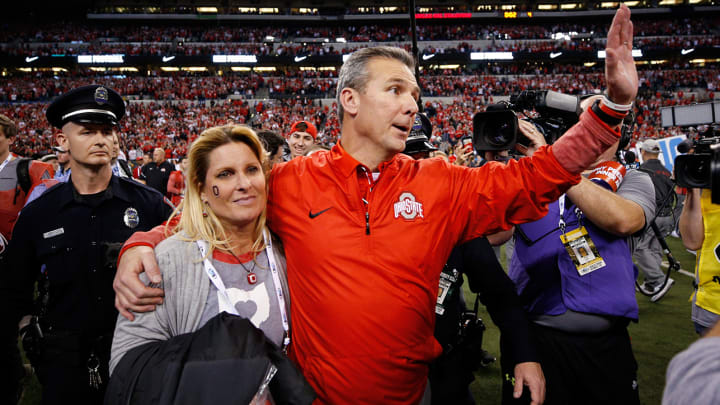Ohio State and the Power Football Coaches' Wives Do and Don't Have

If the head coach knew, he did not seem to care enough to do anything substantial. The women did know, and they texted about it, and it looked a lot like they cared—and they weren’t able to do anything at all.
Wednesday’s exhaustively detailed story from reporter Brett McMurphy indicates Urban Meyer was aware in 2015 of domestic abuse allegations against former wide receivers coach Zach Smith. In explaining his firing of Smith last week at Big Ten media days, Meyer cited that relationship’s turbulent past but said he had known nothing about the ’15 incident until the night before. McMurphy’s story calls that into question, setting up this situation to play out in a sickeningly predictable fashion. We’ve heard some version of these events enough times that when a coach (or general manager, or teammate, or owner) knows about abuse, sits on his hands and eventually issues well-work platitudes about caring, it’s hard to take the message seriously.
As I sifted through the gruesome details within McMurphy’s story—photos of Courtney Smith’s cut hand and swollen arm, verbally abusive text messages from Zach, her account of being screamed at on her bathroom floor—I kept coming back to the other women mentioned. Shelley Meyer has been part of the narrative from its start at media days on July 24, when the coach discussed his perspective on a 2009 incident when Smith was on his staff at Florida. “Shelley and I both got involved because of our relationship with that family and advised for counseling and wanted to help as we moved forward,” Meyer said that day in Chicago. Text messages of support between Courtney Smith and Shelley Meyer and between Smith and Lindsey Voltolini, wife of Ohio State football operations director Brian Voltolini, provide some of the most poignant anecdotes of McMurphy’s piece, including Shelley consoling Courtney and telling her, “please don’t give up.” As Courtney Smith told McMurphy, “All the (coaches’) wives knew. They all did. Every single one.”
Nowhere in those messages is it explicit that the Ohio State coaches knew about the content of their wives’ texts. On top of her words of encouragement, Shelley Meyer offers to buy Courtney Smith groceries. Lindsey Voltolini writes “don’t worry about urb” in reassuring Smith that everything will be handled properly. But from everything Courtney Smith said in an interview released by Stadium on Wednesday, there is no reason to assume Shelley Meyer didn’t pass what she knew along to Urban Meyer as she said she would. Generally speaking, wives give husbands information that might affect their high-stakes, overly scrutinized jobs.
In this case, whatever the wives told their husbands appears to have fallen on deaf ears.
Meyer mentions his wife more than any football coach I’ve ever covered—she is his moral compass, his soulmate—but having a wife who you say is a good person isn’t a get-out-of-jail-free card. Wives of other longtime staff members seemed to truly care, and still nothing changed.
There’s no way they could have known screenshots of their words would be posted on the internet for hundreds of thousands of people to read, and still, they come off as genuinely supportive. Shelley in particular tells Smith that her safety and her kids’ health are paramount. It’s impossible to quantify what reading those words must have meant to Smith in the moment; domestic abusers often isolate their victims from the people they care about, and the head coach’s wife offered a connection.
What made this story unique—the private support Courtney Smith received from other women who were pulled into it—ultimately makes it even more frustrating. The kernel of good intention appears to have been totally obscured by the looming interests of a high-profile football program. In the end, it didn’t matter that these women knew, that they had the ear of men who could have put a stop to the abuse, or at minimum brought the abuser closer to discipline. Meyer may have perfectly summarized this phenomenon of inaction last week without even knowing it, while describing his takeaways from the 2009 incident. “It was a very young couple,” he said, “and I saw a very talented coach and we moved forward.” In short: Football could exempt Zach Smith from repercussions, and Urban Meyer provided the final calculation.
To be a woman in the world of football is to be an outsider. Even coaches’ wives, many of whom joke that they married the sport along with the man, are shut out at some point. Years ago, I wrote a story about the bonds those women create, bound by their otherness in this brutish sphere. It was heartwarming to hear about the sort of sorority they form, supporting each other as their husbands work crazy hours and move them from here to there and back again for jobs that sometimes pay next to nothing. But ultimately, those relationships have practical benefits, providing relief when there’s no one to talk to at night after the kids have gone to bed. They remain little match for the other forces at work.
Shelley Meyer, a registered nurse who is an instructor at Ohio State’s nursing school, likely reported what she knew up the chain of command, as she should have—but in this case, the chain of command doesn’t seem to have meant her supervisor at the university, but her husband. And so football factors devoured the story, swamped Courtney Smith with reasons to stay quiet, boomed louder than the support network she’d built. Let’s not forget that the pain of this situation falls squarely on the shoulders of Zach Smith. But the structure of big-time football gets an assist, for turning women from outsiders into something even worse: powerless witnesses to its broken system.

Staff writer Joan Niesen returned to SI in 2014 after first coming to SI as an intern while in graduate school. She covers college football and the NFL.